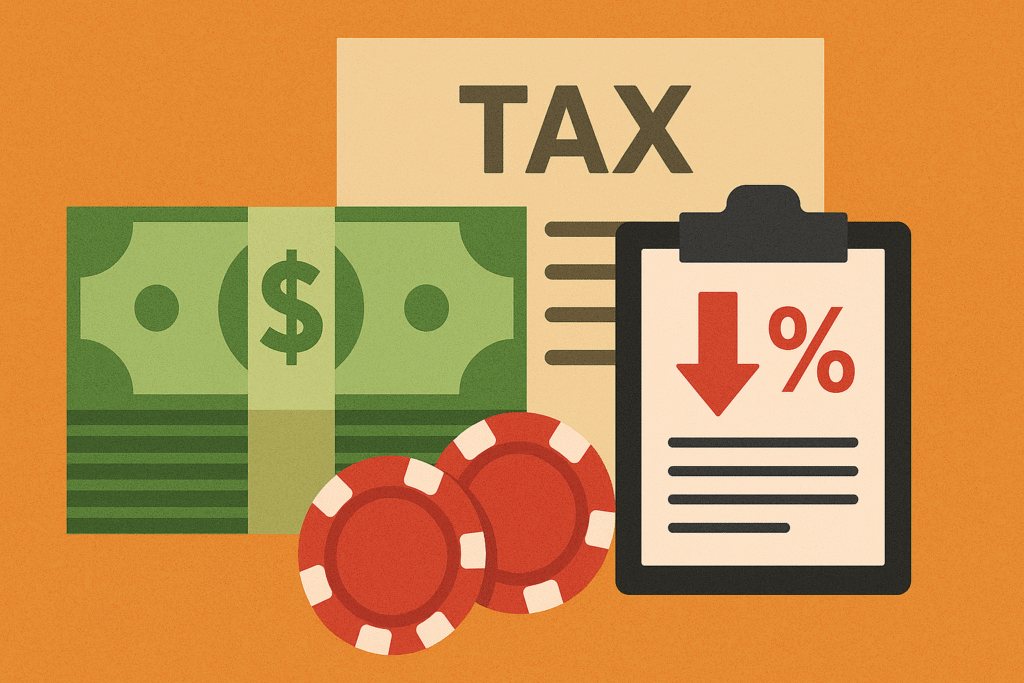An obscure but impactful change to gambling tax deductions buried in President Donald Trump’s newly passed legislative package has sparked outrage across the U.S. gambling industry. The provision, which reduces how much gamblers can deduct in losses against their winnings, is expected to raise over $1 billion for the federal government over the next decade—but critics say it may devastate professional gambling in the U.S.
What Changed?
Under the current tax system, gamblers are allowed to deduct 100% of their losses from their winnings, meaning only their net earnings are taxed. However, starting January 1, 2026, the new law will reduce that deduction to 90%. This means gamblers will have to report and pay taxes on 10% of their losses—even if they broke even or lost money overall.
Experts warn the shift could make high-stakes and professional gambling financially unviable in the U.S.
“Professional and high-stakes poker players, sports bettors and handicappers are about to be taxed out of business,” said Nelson Rose, law professor emeritus at Whittier Law School.
Real-World Impact: ‘Phantom’ Income Taxed
The implications are particularly dire for professional gamblers who operate on slim margins. Poker pro Phil Galfond highlighted how a gambler winning $100,000 and losing $100,000 in a year would still owe taxes on $10,000 of “phantom” income under the new law. In larger cases, someone who wins $3 million and loses $2.8 million would owe taxes on $480,000, despite only profiting $200,000.
“You could pay more in tax than you won,” Galfond explained.
How Many People Will This Affect?
While the average casual bettor is unlikely to be impacted—most don’t wager enough to require itemized deductions—professional gamblers face serious consequences.
The U.S. gambling industry is booming. In 2024, commercial gaming revenue hit a record $72 billion, according to the American Gaming Association. That included:
- $50 billion from traditional casinos
- $14 billion from sports betting
- $8.4 billion from online gambling (up from $2.4 billion the year before)
Most casual gamblers, however, deposit small sums. A recent academic study found that 99% of sports bettors deposited less than $20,500 over a five-year period.
“For the casual bettor, the direct impact appears negligible,” said Wayne Taylor, marketing professor at Southern Methodist University. “But for professionals, it could mean paying more in taxes than they actually earn.”
Potential Fallout: Offshore and Unregulated Markets
Industry experts warn that the provision could push professional gamblers toward offshore websites or unregulated platforms, eroding transparency and compliance.
“The real risk is pushing high-volume players offshore,” said Taylor.
Additionally, because gambling operators must report large winnings to the IRS using W-2G and 1099 forms, players who don’t meticulously track their losses could end up with inflated taxable income.
Some gamblers may migrate to “prediction markets” like Kalshi.com, which are not regulated as gambling. Donald Trump Jr. announced earlier this year that he joined Kalshi as a strategic adviser after betting successfully on his father’s 2024 election win.
Legislative Pushback: Democrats Seek to Repeal Provision
Following the bill’s passage—approved solely with Republican votes—Democratic lawmakers and Nevada gaming advocates have moved to eliminate the controversial provision.
On July 7, Reps. Dina Titus (D-Nev.) and Ro Khanna (D-Calif.) introduced legislation to remove the gambling deduction change.
“This common-sense legislation will bring fairness back to gaming taxation,” Titus said. “We should be encouraging players to properly report their winnings and wager using legal operators.”
Still, repealing the change will be an uphill battle. The gambling provision was just two paragraphs in a nearly 900-page bill that was carefully crafted to pass without Democratic support. The American Gaming Association has stated it will continue working with lawmakers to reverse the change and ensure tax fairness for the industry.
As the January 2026 implementation date looms, industry insiders warn that the future of professional gambling in the U.S. may hang in the balance.



